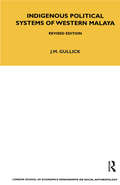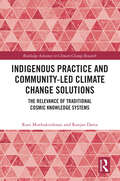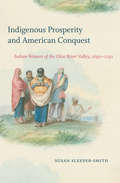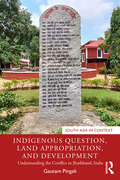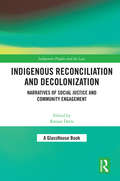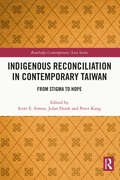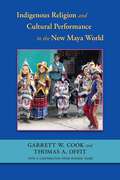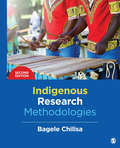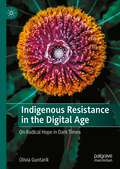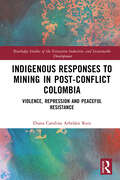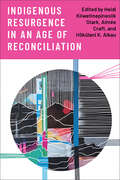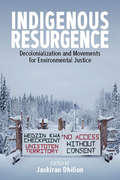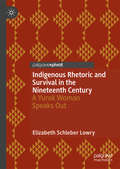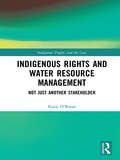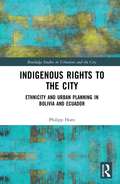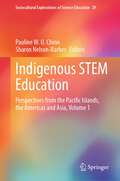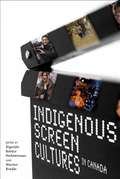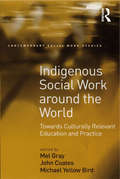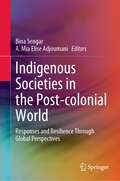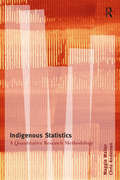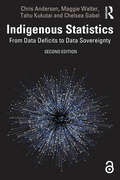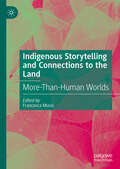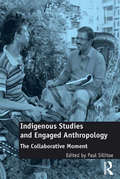- Table View
- List View
Indigenous Political Systems of West Malaya: Revised Edition (London School Of Economics Monographs On Social Anthropology Ser. #17)
by J. M. GullickAn analysis of the political organization of the traditional government of the Malay Sultans before the introduction of British rule in 1874.
Indigenous Practice and Community-Led Climate Change Solutions: The Relevance of Traditional Cosmic Knowledge Systems (Routledge Advances in Climate Change Research)
by Ranjan Datta Rani MuthukrishnanThis book centers Indigenous knowledge and practice in community-led climate change solutions. This book will be one of the first academic books to use the consciousness framework to examine and explain humans' situatedness and role in maintaining ecosystems' health. Drawing on teachings from the Indigenous Adi-Shaiva community, the authors present up-to-date research on meanings and implications of South Asian traditional cosmic knowledge, which focuses on relationality and spirituality connected to climate change. This knowledge can create innovative climate change solutions in areas including land, water, traditional management, sustainability goals and expectations, and state development projects. Overall, this book provides an innovative framework for nonviolent climate solutions, which has its foundations in a traditional cosmic and consciousness-based context. This book, which aims to bridge the gap between Indigenous and Western perspectives by re-educating researchers and decolonizing popular climate change solutions, will be of great interest to students and scholars studying climate change, conservation, environmental anthropology, and Indigenous studies on a broader scale.
Indigenous Practice and Community-Led Climate Change Solutions: The Relevance of Traditional Cosmic Knowledge Systems (Routledge Advances in Climate Change Research)
by Ranjan Datta Rani MuthukrishnanThis book centers Indigenous knowledge and practice in community-led climate change solutions.This book will be one of the first academic books to use the consciousness framework to examine and explain humans' situatedness and role in maintaining ecosystems' health. Drawing on teachings from the Indigenous Adi-Shaiva community, the authors present up-to-date research on meanings and implications of South Asian traditional cosmic knowledge, which focuses on relationality and spirituality connected to climate change. This knowledge can create innovative climate change solutions in areas including land, water, traditional management, sustainability goals and expectations, and state development projects. Overall, this book provides an innovative framework for nonviolent climate solutions, which has its foundations in a traditional cosmic and consciousness-based context.This book, which aims to bridge the gap between Indigenous and Western perspectives by re-educating researchers and decolonizing popular climate change solutions, will be of great interest to students and scholars studying climate change, conservation, environmental anthropology, and Indigenous studies on a broader scale.
Indigenous Prosperity and American Conquest: Indian Women of the Ohio River Valley, 1690-1792 (Published by the Omohundro Institute of Early American History and Culture and the University of North Carolina Press)
by Susan Sleeper-SmithIndigenous Prosperity and American Conquest recovers the agrarian village world Indian women created in the lush lands of the Ohio Valley. Algonquian-speaking Indians living in a crescent of towns along the Wabash tributary of the Ohio were able to evade and survive the Iroquois onslaught of the seventeenth century, to absorb French traders and Indigenous refugees, to export peltry, and to harvest riparian, wetland, and terrestrial resources of every description and breathtaking richness. These prosperous Native communities frustrated French and British imperial designs, controlled the Ohio Valley, and confederated when faced with the challenge of American invasion.By the late eighteenth century, Montreal silversmiths were sending their best work to Wabash Indian villages, Ohio Indian women were setting the fashions for Indigenous clothing, and European visitors were marveling at the sturdy homes and generous hospitality of trading entrepots such as Miamitown. Confederacy, agrarian abundance, and nascent urbanity were, however, both too much and not enough. Kentucky settlers and American leaders—like George Washington and Henry Knox—coveted Indian lands and targeted the Indian women who worked them. Americans took women and children hostage to coerce male warriors to come to the treaty table to cede their homelands. Appalachian squatters, aspiring land barons, and ambitious generals invaded this settled agrarian world, burned crops, looted towns, and erased evidence of Ohio Indian achievement. This book restores the Ohio River valley as Native space.
Indigenous Question, Land Appropriation, and Development: Understanding the Conflict in Jharkhand, India (South Asia in Context)
by Gautam PingaliThis book provides a first-hand account of land conflict and power relations in one of the most resource-rich states in India — Jharkhand. Through the eyes of the state, corporate, and indigenous actors, it reveals how conflict over land in Jharkhand is firmly embedded in the ideological foundations of the key actors in the region. Based on thorough research on the ground and interviews with state, corporate, and indigenous actors, the book explores a host of themes such as: the need and efficacy of state-led modernisation programmes, the market as the best regulator, and ‘ideas’ of development. The volume highlights how land conflicts in Jharkhand will persist until the ideological differences are recognised and welcomed in hopes of making way for collaborative governance. This work will be a key intervention in the fields of area studies, especially South Asian studies, public policy, politics, and development studies.
Indigenous Reconciliation and Decolonization: Narratives of Social Justice and Community Engagement (Indigenous Peoples and the Law)
by Ranjan DattaThis book addresses the ethical and practical issues at stake in the reconciliation of Indigenous and non-indigenous communities. An increasing number of researchers, educators, and social and environmental activists are eager to find ways to effectively support ongoing attempts to recognize, integrate and promote Indigenous perspectives and communities. Taking Canada as its focus, this book offers a multidisciplinary consideration of a range of reconciliation policies, practices and initiatives that are relevant in all settler states. Set against its increasing neoliberal appropriation, the book resituates reconciliation in the everyday contexts of community interaction and engagement, as well as in the important areas of Indigenous knowledge, resource management and social and environmental justice. Reconciliation is not just the responsibility of law and government. And, attuned to the different perspectives of settlers, migrants and refugee communities, the book examines areas of opportunity, as well as obstacles to progress, in the forging of a truly decolonizing framework for reconciliation. As the challenges of reconciliation cross numerous academic and substantial areas, this book will appeal to a range of scholars and practitioners working in law, politics, education, environmental studies, anthropology and Indigenous studies.
Indigenous Reconciliation in Contemporary Taiwan: From Stigma to Hope (Routledge Contemporary Asia Series)
by Peter Kang Jolan Hsieh Scott E. SimonThis book draws attention to the issues of Indigenous justice and reconciliation in Taiwan, exploring how Indigenous actors affirm their rights through explicitly political and legal strategies, but also through subtle forms of justice work in films, language instruction, museums, and handicraft production. Taiwan’s Indigenous peoples have been colonized by successive external regimes, mobilized into war for Imperial Japan, stigmatized as primitive "mountain compatriots" in need of modernization, and instrumentalized as proof of Taiwan’s unique identity vis-à-vis China. Taiwan’s government now encapsulates them in democratic institutions of indigeneity. This volume emphasizes that there is new hope for real justice in an era in which states and Indigenous peoples seek meaningful forms of reconciliation at all levels and arenas of social life. The chapters, written by leading Indigenous, Taiwanese, and international scholars in their respective fields, examine concrete situations in which Indigenous peoples seek justice and decolonization from the perspectives of territory and sovereignty, social work and justice. Illustrating that there is new hope for real justice in an era in which states and Indigenous peoples seek meaningful forms of reconciliation, this book is an invaluable resource for students and scholars of Taiwan Studies, Indigenous Studies and Social Justice Studies.
Indigenous Religion and Cultural Performance in the New Maya World
by Thomas A. Offit Garrett W. CookBased on more than thirty years of ethnographic fieldwork in Highland Guatemala, this study of Maya diviners, shamans, ritual dancers, and religious brotherhoods describes the radical changes in traditional Maya religious practice wrought by economic globalization and political turmoil. Focusing on the primary participants in the annual festival in the K&’iche&’ Maya village of Santiago Momostenango, the authors show how older religious traditionalists and the new generation of &“cultural activist&” religious practitioners interact within a single local community, and how their competing agendas for adapting Maya religiosity to a new and continually changing political economy are perpetuating and changing Maya religious traditions.
Indigenous Research Methodologies
by Dr. Bagele ChilisaAuthor Bagele Chilisa updates her groundbreaking book to give a new generation of scholars a crucial foundation in indigenous methods, methodologies, and epistemologies. This new edition of Indigenous Research Methodologies addresses the increasing emphasis in the classroom and in the field to sensitize researchers and students to diverse perspectives, especially those of women, minority groups, former colonized societies, indigenous peoples, historically oppressed communities, and people with disabilities. The second edition situates research in a larger historical, cultural, and global context so students can apply the specific methods that are commensurate with the transformative paradigm of social science research. Chapters cover the history of research methods, ethical conduct, colonial and postcolonial epistemologies, relational epistemologies, emergent and indigenous methodologies, Afrocentric research, feminist research, narrative frameworks, interviewing, and participatory methods. New to the second edition are three new applied chapters covering evaluation, mixed methods, and a case study in mixed methods evaluation. These chapters focusing on decolonizing, indigenizing, and integrating these methods and applications to enhance participation of indigenous peoples as knowers and foster collaborative relationships. Additional information on indigenous quantitative research reflects new developments in the field. New activities and web resources offer more depth and new ways for students to extend their knowledge. This book includes features such as key points, learning objectives, student exercises, chapter summaries, and suggested readings, making it an ideal course book for graduate-level students and applied researchers.
Indigenous Research Methodologies
by Dr. Bagele ChilisaAuthor Bagele Chilisa updates her groundbreaking book to give a new generation of scholars a crucial foundation in indigenous methods, methodologies, and epistemologies. This new edition of Indigenous Research Methodologies addresses the increasing emphasis in the classroom and in the field to sensitize researchers and students to diverse perspectives, especially those of women, minority groups, former colonized societies, indigenous peoples, historically oppressed communities, and people with disabilities. The second edition situates research in a larger historical, cultural, and global context so students can apply the specific methods that are commensurate with the transformative paradigm of social science research. Chapters cover the history of research methods, ethical conduct, colonial and postcolonial epistemologies, relational epistemologies, emergent and indigenous methodologies, Afrocentric research, feminist research, narrative frameworks, interviewing, and participatory methods. New to the second edition are three new applied chapters covering evaluation, mixed methods, and a case study in mixed methods evaluation. These chapters focusing on decolonizing, indigenizing, and integrating these methods and applications to enhance participation of indigenous peoples as knowers and foster collaborative relationships. Additional information on indigenous quantitative research reflects new developments in the field. New activities and web resources offer more depth and new ways for students to extend their knowledge. This book includes features such as key points, learning objectives, student exercises, chapter summaries, and suggested readings, making it an ideal course book for graduate-level students and applied researchers.
Indigenous Resistance in the Digital Age: On Radical Hope in Dark Times
by Olivia GuntarikFrom climate catastrophes to sudden wars, the world faces conflicts of unprecedented scale. Yet around the globe, Indigenous leaders continue to move forward with determination and hope. Leaders demand change, resisting the destruction of the environment and suggesting solutions to today’s global crisis. Age-old practices are experiencing a cultural revival and the lessons call for all of us to walk alongside Indigenous peoples. In the face of crisis and the progress of technology, this book shows how to stand with Indigenous peoples through uncertainty and chaos. How to stand with Indigenous peoples is about how to listen, how to walk together and how to act.
Indigenous Responses to Mining in Post-Conflict Colombia: Violence, Repression and Peaceful Resistance (Routledge Studies of the Extractive Industries and Sustainable Development)
by Diana Carolina Arbeláez RuizThis book examines Indigenous responses to mining and their connection to peacebuilding, focusing on the experience of the Nasa Indigenous people of North Cauca during the most recent Colombian post-agreement transition. Amid an armed conflict that has disproportionally affected and targeted the Nasa, as well as ongoing processes of dispossession and oppression, the Nasa have built a tradition of organised, peaceful resistance. This book examines the nature of their responses to mining and how this is linked to peacebuilding, with a focus on how resistance is shaped and enacted to respond to the relationship mineral extraction has with violence and peace. The work is exploratory, ethnographic and interdisciplinary in nature, sitting in the intersection between the anthropology of mining, development studies and peace and conflict studies. The author presents and analyses narratives, participant responses, and her own experiences to illustrate the context and interconnected processes shaping Nasa responses to mining during this transition period. The book will bring international readers closer to these intricate dynamics, where access is otherwise limited because of security, cultural, linguistic and other barriers. The book provides a novel perspective on post-conflict mining governance by focusing on the Nasa’s active role in responding to mining in a post-agreement, transitional context. It highlights, and encourages engagement with, the often-overlooked role of morality in debates about nature and development. This book will be of great interest to students, scholars and practitioners of the extractive industries, natural resource management, conflict management and peacebuilding, Indigenous Peoples and Latin American studies.
Indigenous Resurgence in an Age of Reconciliation
by Aimée Craft Heidi Kiiwetinepinesiik HŌkūlani K. AikauWhat would Indigenous resurgence look like if the parameters were not set with a focus on the state, settlers, or an achievement of reconciliation? Indigenous Resurgence in an Age of Reconciliation explores the central concerns and challenges facing Indigenous nations in their resurgence efforts, while also mapping the gaps and limitations of both reconciliation and resurgence frameworks. The essays in this collection centre the work of Indigenous communities, knowledge, and strategies for resurgence and, where appropriate, reconciliation. The book challenges narrow interpretations of indigeneity and resurgence, asking readers to take up a critical analysis of how settler colonial and heteronormative framings have infiltrated our own ways of relating to our selves, one another, and to place. The authors seek to (re)claim Indigenous relationships to the political and offer critical self-reflection to ensure Indigenous resurgence efforts do not reproduce the very conditions and contexts from which liberation is sought. Illuminating the interconnectivity between and across life in all its forms, this important collection calls on readers to think expansively and critically about Indigenous resurgence in an age of reconciliation.
Indigenous Resurgence: Decolonialization and Movements for Environmental Justice
by Jaskiran DhillonFrom the Standing Rock Sioux Tribe’s resistance against the Dakota Access pipeline to the Nepalese Newar community’s protest of the Fast Track Road Project, Indigenous peoples around the world are standing up and speaking out against global capitalism to protect the land, water, and air. By reminding us of the fundamental importance of placing Indigenous politics, histories, and ontologies at the center of our social movements, Indigenous Resurgence positions environmental justice within historical, social, political, and economic contexts, exploring the troubling relationship between colonial and environmental violence and reframing climate change and environmental degradation through an anticolonial lens.
Indigenous Rhetoric and Survival in the Nineteenth Century: A Yurok Woman Speaks Out
by Elizabeth Schleber LowryIn 1916, Lucy Thompson, an indigenous woman from Northwestern California, published To the American Indian: Reminiscences of a Yurok Woman. The first book to be published by a member of the California Yurok tribe, it offers an autobiographical view of the intricacies of life in the tribe at the dawn of the twentieth century, as well as a powerful critique of the colonial agenda. Elizabeth Schleber Lowry presents a rhetorical analysis of this iconic text, investigating how Thompson aimed to appeal to diverse audiences and constructed arguments that still resonate today. Placing Thompson’s work in the context of nineteenth-century Native American rhetoric, Lowry argues that Thompson is a skillful rhetor who has much to teach us about our nation’s violent past and how it continues to shape our culture and politics. In To the American Indian, Thompson challenges negative stereotypes about indigenous cultures and contrasts widespread Euroamerican abuse of natural resources with Yurok practices that once effectively maintained the region’s ecological and social stability. As such, Thompson’s text functions not only as a memoir, but also as a guide to sustainable living.
Indigenous Rights and Water Resource Management: Not Just Another Stakeholder (Indigenous Peoples and the Law)
by Katie O'BryanIn an era of climate change, the need to manage our water resources effectively for future generations has become an increasingly significant challenge. Indigenous management practices have been successfully used to manage inland water systems around the world for thousands of years, and Indigenous people have been calling for a greater role in the management of water resources. As First Peoples and as holders of important knowledge of sustainable water management practices, they regard themselves as custodians and rights holders, deserving of a meaningful role in decision-making. This book argues that a key (albeit not the only) means of ensuring appropriate participation in decision-making about water management is for such participation to be legislatively mandated. To this end, the book draws on case studies in Australia and New Zealand in order to elaborate the legislative tools necessary to ensure Indigenous participation, consultation and representation in the water management landscape.
Indigenous Rights to the City: Ethnicity and Urban Planning in Bolivia and Ecuador (Routledge Studies in Urbanism and the City)
by Philipp HornThis book breaks new ground in understanding urban indigeneity in policy and planning practice. It is the first comprehensive and comparative study that foregrounds the complex interplay of multiple organisations involved in translating indigenous rights to the city in Latin America, focussing on the cities of La Paz and Quito. The book establishes how planning for urban indigeneity looks in practice, even in seemingly progressive settings, such as Bolivia and Ecuador, where indigenous rights to the city are recognised within constitutions. It demonstrates that the translation of indigenous rights to the city is a process involving different actor groups operating within state institutions and indigenous communities, which often hold conflicting interests and needs. The book also establishes a set of theoretical, methodological, and practical foundations for envisaging how urban indigenous planning in Latin America and elsewhere should be understood, studied, and undertaken: As a process which embraces conflict and challenges power relations within indigenous communities and between these communities and the state. This book will appeal to practitioners, researchers, and students working within the fields of urban planning, urban development, and indigenous rights.
Indigenous STEM Education: Perspectives from the Pacific Islands, the Americas and Asia, Volume 1 (Sociocultural Explorations of Science Education #29)
by Sharon Nelson-Barber Pauline W. U. ChinnThis book explores ways in which systems of local knowledge, culture, language, and place are foundational for STEM learning in Indigenous communities. It is part of a two-volume set that addresses a growing recognition that interdisciplinary, cross-cultural and cross-hybrid learning is needed to foster scientific and cultural understandings and move STEM learning toward more just and sustainable futures for all learners. Themes of learning from elders, through practice and place-based experiences are found across cultures. Each chapter brings a uniquely Indigenous point of view to the educational transformation efforts taking place in these distinct contexts. In the second section the chapters use authentic research stories to explain many ways in which regular disciplinary policies and practices can impact Indigenous students’ participation in STEM classrooms and careers. These authors go on to discuss ways to engage learners in STEM activities that are interconnected with the contexts of their lives.
Indigenous Screen Cultures in Canada
by Sigurjón Baldur Hafsteinsson Marian BredinIndigenous media challenges the power of the state, erodes communication monopolies, and illuminates government threats to indigenous cultural, social, economic, and political sovereignty. Its effectiveness in these areas, however, is hampered by government control of broadcast frequencies, licensing, and legal limitations over content and ownership.Indigenous Screen Cultures in Canada explores key questions surrounding the power and suppression of indigenous narrative and representation in contemporary indigenous media. Focussing primarily on the Aboriginal Peoples Television Network, the authors also examine indigenous language broadcasting in radio, television, and film; Aboriginal journalism practices; audience creation within and beyond indigenous communities; the roles of program scheduling and content acquisition policies in the decolonization process; the roles of digital video technologies and co-production agreements in indigenous filmmaking; and the emergence of Aboriginal cyber-communities.
Indigenous Social Work around the World: Towards Culturally Relevant Education and Practice (Contemporary Social Work Studies)
by John CoatesHow can mainstream Western social work learn from and in turn help advance indigenous practice? This volume brings together prominent international scholars involved in both Western and indigenous social work across the globe - including James Midgley, Linda Briskman, Alean Al-Krenawi and John R. Graham - to discuss some of the most significant global trends and issues relating to indigenous and cross-cultural social work. The contributors identify ways in which indigenization is shaping professional social work practice and education, and examine how social work can better address diversity in international exchanges and cross-cultural issues within and between countries. Key theoretical, methodological and service issues and challenges in the indigenization of social work are reviewed, including the way in which adaptation can lead to more effective practices within indigenous communities and emerging economies, and how adaptation can provide greater insight into cross-cultural understanding and practice.
Indigenous Societies in the Post-colonial World: Responses and Resilience Through Global Perspectives
by Bina Sengar A. Mia Elise AdjoumaniThis edited book provides perceptions on “indigeneity” through a global perspective. Emphasizing the contemporary and postcolonial debates on indigenous, it delves into diversity and dissonance within indigenous concepts. Through its chapters based on theoretical and empirical studies from Asian, African, and American perceptions of indigenous societies, it brings out complexity, resilience, and response of “indigenous” in the post-colonial global society. It especially looks at how these societies manage to move forward by going beyond the stigma of the colonial past. The chapters in the book are divided into three sections where they discuss indigenous cultures through interdisciplinary perspectives. The narrative approach of historical concepts and contemporary indigenous challenges within the book include anthropological, cultural, ecological, historical, literary, and legal studies. The contributions in the collection come from widely respected international scholars who are engaged in indigeneity and postcolonial questions. It allows the reader to (re)discover the theories and resilience of the indigenous societies that are historically marked and are reshaping the histories and contemporary narratives in the world. This book is of particular interest to scholars, students, policymakers, and people curious about the histories and the dynamic progress of the indigenous and indigenous societies of Africa, the Americas, and Asia.
Indigenous Statistics: A Quantitative Research Methodology
by Chris Andersen Maggie WalterIn the first book ever published on Indigenous quantitative methodologies, Maggie Walter and Chris Andersen open up a major new approach to research across the disciplines and applied fields. While qualitative methods have been rigorously critiqued and reformulated, the population statistics relied on by virtually all research on Indigenous peoples continue to be taken for granted as straightforward, transparent numbers. This book dismantles that persistent positivism with a forceful critique, then fills the void with a new paradigm for Indigenous quantitative methods, using concrete examples of research projects from First World Indigenous peoples in the United States, Australia, and Canada. Concise and accessible, it is an ideal supplementary text as well as a core component of the methodological toolkit for anyone conducting Indigenous research or using Indigenous population statistics.
Indigenous Statistics: From Data Deficits to Data Sovereignty
by Chris Andersen Maggie Walter Tahu Kukutai Chelsea GabelThis second edition of the groundbreaking Indigenous Statistics opens up a major new approach to research across the disciplines and applied fields. While qualitative methods have been rigorously critiqued and reformulated, the population statistics relied on by virtually all research on Indigenous Peoples continue to be taken for granted as straightforward, transparent numbers. Drawing on a diverse new author team, this book dismantles that persistent positivism with a forceful critique, then fills the void with a new paradigm for Indigenous quantitative methods using concrete examples of research projects from first world Indigenous Peoples in the United States, Australia, Aotearoa New Zealand and Canada. Concise and accessible, it is an ideal supplementary text as well as a core component of the methodological toolkit for anyone conducting Indigenous research or using Indigenous population statistics. This is an essential text for students studying quantitative methods, statistics and research methods. The Open Access version of this book, available at http://www.taylorfrancis.com, has been made available under a Creative Commons Attribution-Non-Commercial-No Derivative Licence (CC-BY-NC-ND) 4.0 license.
Indigenous Storytelling and Connections to the Land: More-Than-Human Worlds
by Francesca MussiThis book builds on the perspective that, for Indigenous peoples, relations to the land are familial, intimate, intergenerational, spiritual, instructive, and life nourishing, and it is these relations that Western societies sought to destroy as part of their colonial projects of territorial conquest and exploitation of resources. Positioning storytelling as a research methodology and a model of decolonial practice, this edited collection seeks to explore the following key questions: how does Indigenous storytelling contribute to understanding Indigenous identity and the crucial role of the land in Indigenous ways of life? How can Indigenous storytelling subvert colonial narratives of the land? How can Indigenous storytelling contribute to addressing colonial exploitations of the land and its resources? Can Indigenous storytelling become a rich mode for the investigation of current climate crises? And, finally, how does storytelling assist Indigenous peoples in restoring their intimate relations to the land and its natural gifts? Through critical analysis of a unique range of Indigenous storytelling practices, including fiction, performative art, new media platforms, archaeological findings and personal live-experienced stories, this collection aims to examine the interplay between colonialism and current environmental challenges, and to expose the impacts – past, present, and future – of Western worldviews on Indigenous connections to the land, whilst simultaneously bringing to the fore Indigenous ethos of care and land custodianship.
Indigenous Studies and Engaged Anthropology: The Collaborative Moment
by Paul SillitoeAdvancing the rising field of engaged or participatory anthropology that is emerging at the same time as increased opposition from Indigenous peoples to research, this book offers critical reflections on research approaches to-date. The engaged approach seeks to change the researcher-researched relationship fundamentally, to make methods more appropriate and beneficial to communities by involving them as participants in the entire process from choice of research topic onwards. The aim is not only to change power relationships, but also engage with non-academic audiences. The advancement of such an egalitarian and inclusive approach to research can provoke strong opposition. Some argue that it threatens academic rigour and worry about the undermining of disciplinary authority. Others point to the difficulties of establishing an appropriately non-ethnocentric moral stance and navigating the complex problems communities face. Drawing on the experiences of Indigenous scholars, anthropologists and development professionals acquainted with a range of cultures, this book furthers our understanding of pressing issues such as interpretation, transmission and ownership of Indigenous knowledge, and appropriate ways to represent and communicate it. All the contributors recognise the plurality of knowledge and incorporate perspectives that derive, at least in part, from other ways of being in the world.
